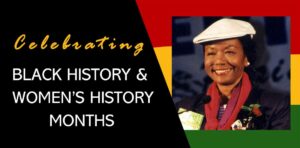 As we begin the month of February, we would like to take the opportunity to recognize a pro-life leader who characterizes both Black History and Women’s History months.
As we begin the month of February, we would like to take the opportunity to recognize a pro-life leader who characterizes both Black History and Women’s History months.
Back in the day, on January 21, 1947, Mildred Fay Jefferson was admitted to Harvard Medical School (HMS). Four years later, she became the first black woman to graduate from the institution. Dr. Mildred Jefferson was an accomplished, Black pro-life maven.
After graduating from HMS, Jefferson became the first female surgeon to work at Boston University’s Medical Center. In the 1970s, she used her status as a doctor to argue that life begins at conception. In the March/April 1972 issue of Boston University’s Centerscope magazine, she wrote:
“From conception, the complex, dynamic, developing organism-child is separate and distinct from its mother.”
Further, in an interview with the Boston Globe in 1976, Jefferson explained that her vocation and Hippocratic oath bound her to the “preservation of life.”
Her heart-felt interpretation of medical ethics thrust her into activism that would be the centerpiece of Jefferson’s career. In fact, Jefferson went public with her stance on abortion following the American Medical Association’s support for freer abortion laws. She began organizing, as a member of the Value of Life Committee’s board of governors, which she left to develop the Massachusetts Citizens for Life. Her mobilization culminated in the founding of the National Right to Life Committee. Jefferson served as President from 1975-1978.
According to the New York Times, during her activism, she sent a handwritten letter to President Ronald Reagan apologizing for having missed their scheduled meeting due to her speech at a pro-life event in Atlanta. Her advocacy proved powerful—as she is credited with changing Reagan’s stance on abortion from pro-choice to pro-life. In a letter he said to her:
“I wish I would have heard your views before our legislation was passed. You made it irrefutably clear that an abortion is the taking of human life. I’m grateful to you.”
As Jefferson advanced in her pro-life activism, she extended her views about medicine and focused on the long-term impact abortion has on families and the larger community. She said,
“When church groups demand government funding of abortion for poor women, they are updating an old fascist model of social planning; keeping down social costs by getting rid of those who run up costs,” she contended.
In her paper entitled, “The Nature of the Race/Class Factor in Abortion”, Jefferson said that “minority populations of African descent face a special threat” with abortion. She believed abortion was a eugenics strategy that Margaret Sanger, founder of Planned Parenthood, had used to target and cleanse the black population through the “Negro Project.”
To further impact society, she became politically active and gained significant exposure. While her three attempts at the Massachusetts Republican nomination for United States Senate in 1982, 1990 and 1994 were unsuccessful, she continued to advocate for a constitutional amendment that would reverse the 1973 Supreme Court decision of Roe v. Wade. Jefferson’s tireless work for the sanctity of life was timeless as she knew many years ago abortion on demand was a giant step toward totalitarianism. She was able to vocalize the cruelty of abortion, the inhumanity, the scars, and the stains on society. Her work inspired so many—even after her death in 2010.
Through Mildred Jefferson’s example, may we all see the sanctity of life as a basic human right. May we continue to persevere for the recognition of the personhood of the pre-born as well as those facing end of life, without exception.
With help from the Lord, and heroes like Mildred Jefferson, it is our prayer that many will come to understand that all human lives are valuable and created by God in His image.
Sheryl Sellaway
Guest Contributor
